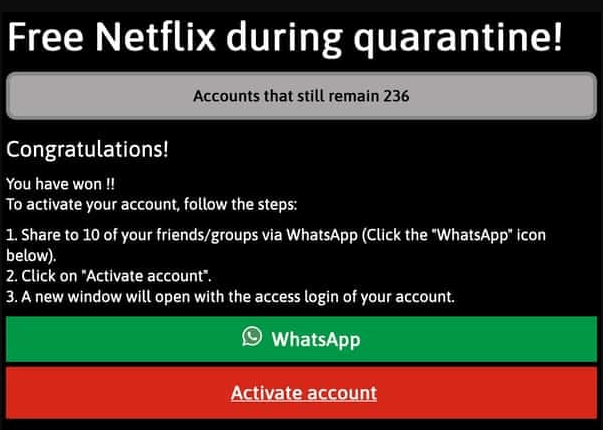Netflix Scams: A Must-Read Guide
The coronavirus pandemic crippled the world as people went into lockdowns, and most of them even lost their lives to the deadly virus. With so many people locked away in their homes, streaming platforms like Netflix saw a massive rise in their viewership. Unfortunately, it also gave fraudsters the chance to victimize people with a bunch of Netflix scams, by claiming to give away free coupons and subscriptions.
Let's take a good look.
Scam Detectors Most Trusted Websites in Online Security
- Guard.io (100): Surf the web safely. Clean up your browser, remove maliscious extensions and check for privacy violations.
- Incogni.com (100): Delete your personal data from the internet and protect against scams and identity theft.
- ExpressVPN (100) Stay secure and anonymous online - Best VPN Out There

Netflix is the #1 streaming platform in the world, with millions of users worldwide. That is why it is a popular target for scammers who usually send phishing emails to Netflix users to steal their login details and credit card information. These scams have become harder to identify.
In this article, we will explain some latest Netflix scams and how to protect yourself against them so you can watch American Netflix in Canada and around the world without fearing exposure.
Netflix Scam Trends
During the Coronavirus pandemic, a new Netflix scam trend emerged where users got a message, supposedly from Netflix. The message stated: “Due to the Coronavirus pandemic worldwide, Netflix is giving some free passes for their platform during the period of isolation. Run on the site cause it will end quickly!” It also included a link at the bottom with the word ‘Netflix' in it.
Now, if you look at the message closely, it includes terrible grammar and broken English with phrases like “Run on the site…” and “It will end quick!” However, the link with Netflix in it still tricked people into thinking that it's legit. When clicked on the link, it directed users to a fake page with customer reviews like on Facebook. The user is then required to share the message on WhatsApp with ten friends or so and enter Netflix login details.
Once you are done, the scam is spread to your friends and contacts, and the scammers end up having your user information and Netflix details. According to the National Fraud Intelligence Bureau (NFIB), there was a 400% increase in coronavirus-related scams and frauds in the past year.
Here is a screenshot of one of these scams:

Another technique used by scammers is sending emails to users saying it's time to update the account to avoid cancellation. It prompts users to click on the “update account now button.” This technique has also been used to target millions of HBO viewers during the Game of Thrones season 8 premiere back in 2019.
These emails usually have a subject line like: “Your account suspension notification.” The body of the email usually contains something like this:
“We are unable to validate your billing information for the next billing month of your subscription. Therefore we will suspend your membership within 48 hours. Update your account details to avoid cancellation.”
A sense of urgency and punctuation error like 48 hours is enough to give it away. The scammers also use the official Netflix logo and somewhat similar email addresses like “info.mailer.netflix.com.” If you see this type of email address, know that it is a scam.
How to Spot & Avoid Fraud
If you have received one of the phishing messages or emails from third-parties pretending to be Netflix, you need to report them to Netflix. The first thing is identifying such emails and messages. IF you look at Netflix's terms of service, you can see that it states three things that should serve as a warning signal that the email is not from Netflix. These red flags include:
- Netflix never asks about your personal information in emails or texts like credit card information, bank account details, or Netflix username and password.
- Netflix never requests users to pay through 3rd party vendors.
- If the email or text contains a lengthy, unrecognizable URL, don't click on it as it probably contains malware.
- Poor grammar and spelling mistakes.
- Sense of urgency that encourages you to act quickly.
If you have received such emails and texts, please never click or reply to the email. In case of suspicious emails or messages, take the following security measures:
- Don't click on any URL or attachments.
- Forward the email to [email protected] and then delete the email or message.
If you have accidentally opened a link or attachment, make sure to change your Netflix password instantly and also contact your credit card company if you have entered the payment information on Netflix as it might be compromised as well.

How to Keep Your Netflix Account Secure
Here are some tips to keep your Netflix account secure to enjoy safe streaming, and to protect your personal information:
- Set a unique Netflix password and change it regularly: Make sure your password is a combination of letters, numbers, and symbols. Avoid using your birthday, name, or address as the password, as these can be easily guessed.
- Sign out of all unused devices: Make sure to sign out of your Netflix account on all devices you don't use anymore. If a device is not in possession right now, you can go to your Account page, sign out of all devices, and log in again on devices you currently use.
- Report all suspicious activity: Netflix takes user data security and fraud very seriously. Therefore, if you encounter something fishy, make sure to report it to Netflix.
Stay Safe from Netflix Traps
Lately, Netflix phishing emails and messages have become quite sophisticated and hard to detect. However, there are always tells and indicators that raise red flags. Therefore, make sure to keep a watchful eye and read your emails thoroughly so you can identify such scams. Last but not least, if you ever do come across such attempts, make sure to report them to Netflix so proper action can be taken against them.
How To Report Netflix Scams
Warn your family and online friends about the Netflix scams by sharing this article on social media. You can also officially report crooks and suspicious email addresses to the Federal Trade Commission (FTC) using the link below:
How To Prevent Identity Theft and More
If you want to be the first to receive (via email) the most notorious scams weekly, subscribe to the Scam Detector newsletter. You'll receive periodic emails – we promise, no spam. Meanwhile, educate yourself with some other Netflix fraud-related articles below, so that you can protect yourself. Last but not least, use the comments section below to expose other Netflix scams.
Here are some must-reads for the end:
Netflix Membership Scam
Verify a website below
Are you just about to make a purchase online? See if the website is legit with our validator:
vldtr®


TOP 4 MUST-WATCH FRAUD PREVENTION VIDEOS
1. Top 5 Amazon Scams in 2024 2. Top 5 PayPal Scams in 2024 3. How To Spot a Scam Email in 2024
- Latest Posts by Selma Hrynchuk
-
How To Stop Robocalls
- -
Taking Control of Your Data Privacy: Protecting Yourself in 2024
- -
The Urgency of Removing Personal Information from the Internet
- All Posts














I’ve been asked to rejoin Netflix by confirming on screen – on my TV. Is this a scam?